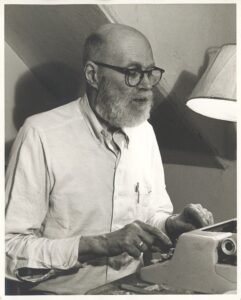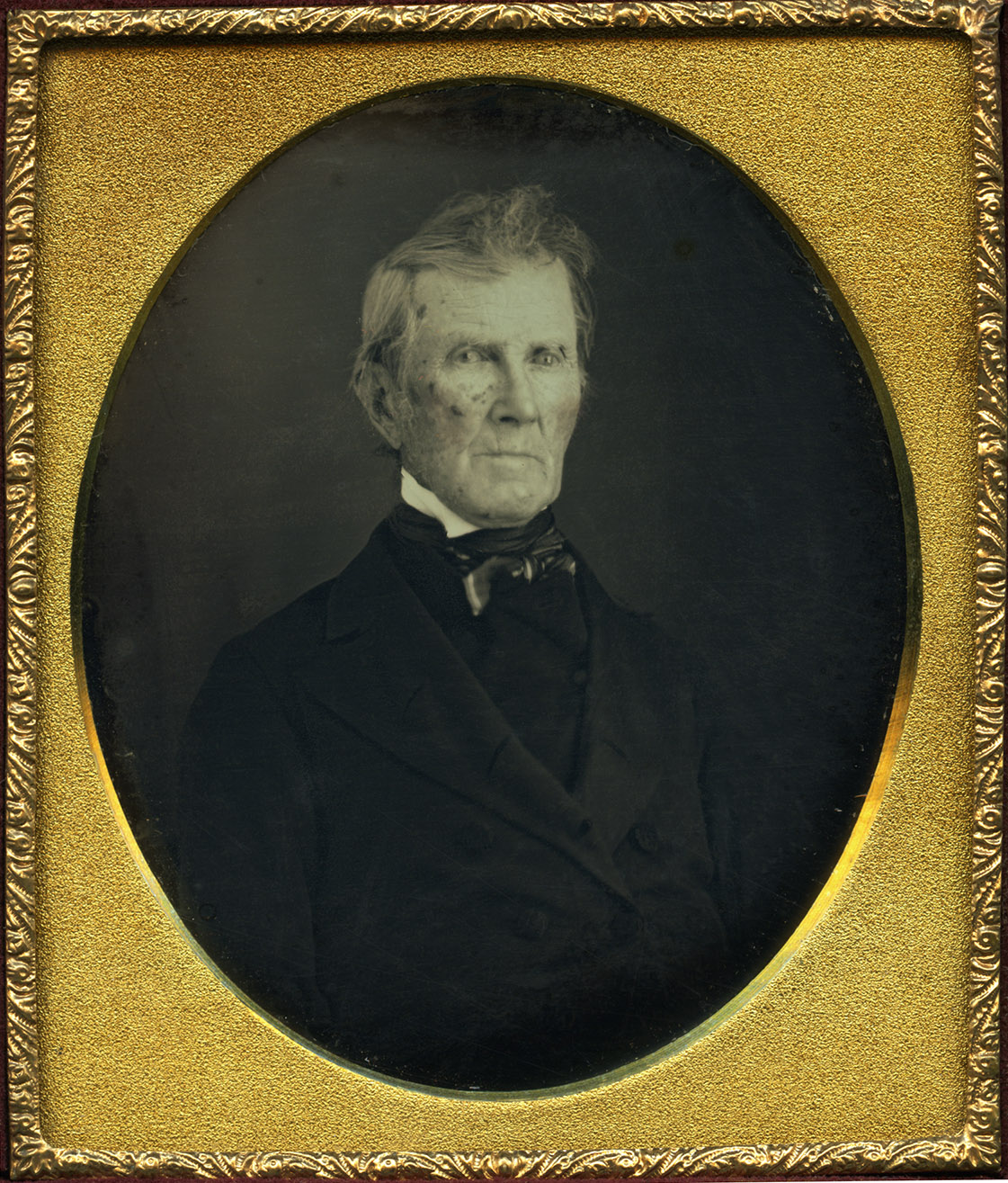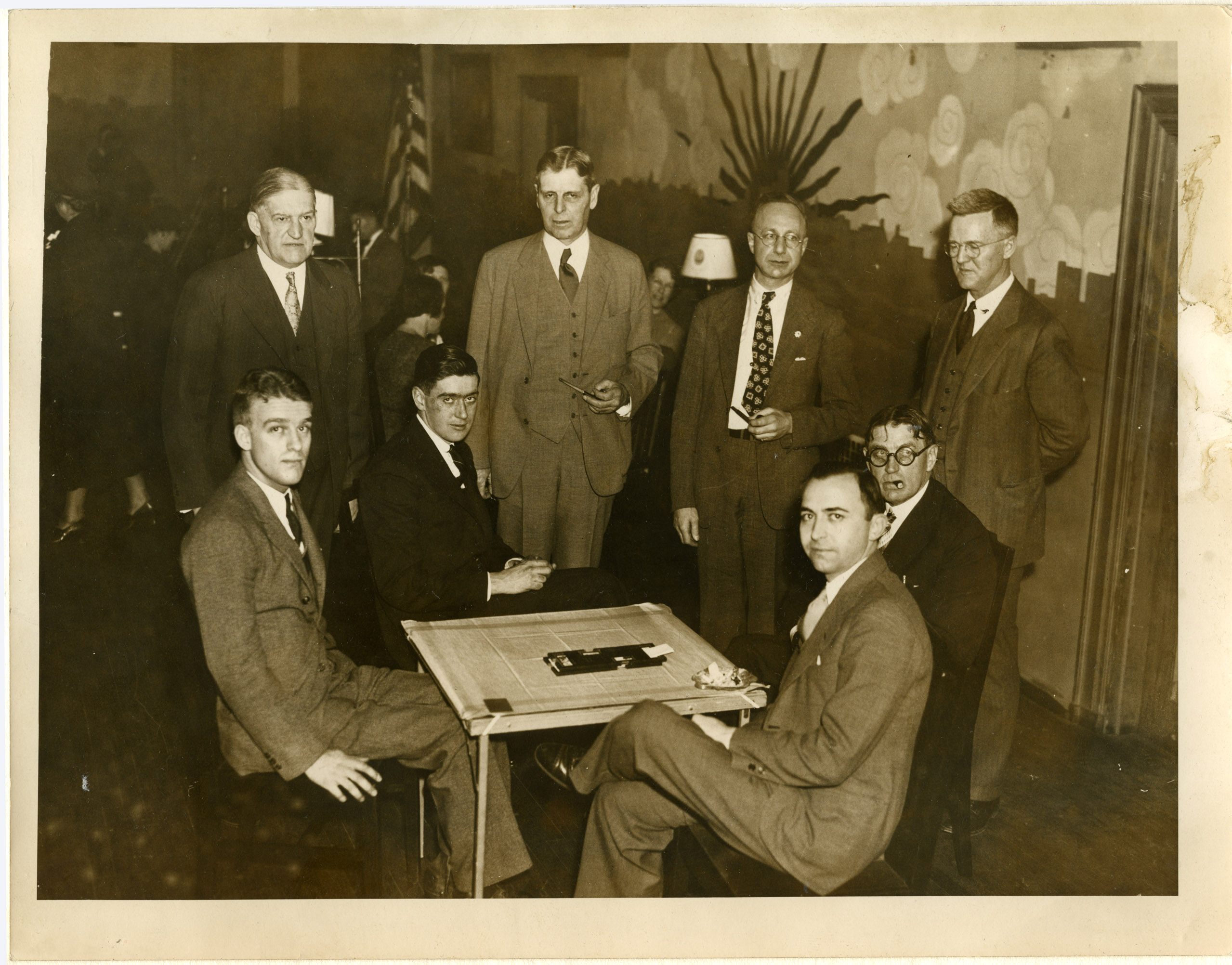 Frederic Allen Whiting at his typewriter
Frederic Allen Whiting at his typewriter
Frederic Allen Whiting Jr., the “Poet Laureate of Perkins Cove”, was born on January 10, 1906 in Boston Massachusetts to Olive Elizabeth Cook, a singer, and Frederic Allen Whiting Sr., a philanthropist and museum director and president of the American Federation of Arts. They moved to Cleveland in 1912 where Frederic Sr. became the director of the Cleveland Museum of Art. Having a father as the director of a cultural heritage institution, exposed young Frederic to the intellectual class. He met poets, scholars, and others from the world of arts and letters including Sir Lawrence Binyon, Langdon Warner, Carl Purington Rollins, and Thomas Whitney Surette. He attended the private Hawken School in Cleveland and Deerfield Academy in Massachusetts, which he referred to later as “redolent of witchcraft and Indian massacres, and compliance with chamber of commerce goals and attitudes”. He went to Harvard for two years before becoming a freelance writer.
Adopting the pen name Allen Whiting, his first foray into writing began when he wrote commentary and criticism for the Magazine of Art, the organ of the American Federation of the Arts, where he was also editor from 1931-1942. Some of his pieces for the magazine were republished in the New York Herald Tribune and The Washington Post. Under his tenure, the circulation rose and he became familiar with all aspects of magazine production and made contacts with members and chapters of the American Federation of Arts, which consisted of artists, writers, teachers, museum officials, art dealers, and officials working with U.S. government cultural projects. On one occasion in 1940, Whiting took charge of the Federation’s annual convention, which met in San Francisco. He left the magazine in May 1942 to participate in the war effort.
Whiting was appointed Chief of the Office of War Information’s Overseas Exhibit Section. Charged with developing programming and staff, Whiting aimed to project positive visual images of the United States to Europeans. He was responsible for planning and carrying through creative programming, administrative duties, and liaison work with other civilian agencies, Army & Navy administrators, business leaders, and the press. Following the end of the war, he was brought to Washington by Elmer Davis to develop an exhibit aimed at explaining to liberated Europe the demand on resources of the continuing war in the Pacific. The project was abandoned following the surrender of Japan in August of 1945.
Following the war, Whiting became a freelance writer and photo editor, wrote two novels, short stories, and non-fiction pieces on a variety of subjects, including politics, the arts, and food. He designed and produced a brochure for a New England children’s camp and was a contracted photo research and editor for the State Department.
In 1951 he was recruited to work as a civilian information specialist with the Department of the Army’s Reorientation Division for occupied areas, which was responsible for supplying materials used to re-educate the people of Japan and the Ryukyu Islands. Out of an office in New York, he supplied the U.S. Information Centers in Japan with musical recordings and other media. The job ended following the end of the U.S. occupation in December, when he resumed freelance writing and editing. He moved his parents from Florida to Ogunquit, Maine in 1952, where he became the Associate Director of the Museum of Art of Ogunquit where he assembled a Winslow Homer exhibit but was later “politely fired” by Henry Strater.
Throughout the 1950s Whiting’s wife Rose suffered from several strokes and eventually died in 1960. Whiting was also caring for his aging parents, which caused much stress and led to excessive drinking where his “control over beverage alcohol had left me behind”. His mother died in 1955. During this time he found solace in the Roman Catholic Church and was committed to the Augusta State Hospital in 1957. Whiting’s battles with alcoholism and simultaneous search for God was explored in his unpublished 1965 autobiographical novel, Minutes of the Days.
The collection contains evidence of an attempt to start an organization called The Society of Servants of Rose Hill, whose aim was to “bring to bear in a practical manner the venerable and curative offices of prayer and work upon those in particular need of them”. The goal was to create cooperatively governed outpatient retreat centers in bucolic settings for people recently released from psychiatric institutions. The mission statement stated that no one would be turned away for financial or religious reasons. There is no evidence that the organization ever came to fruition.
Whiting’s career as a published poet began in the 4th grade. He was eventually published in several magazines including Spirit: A Magazine of Poetry, The American Poetry Magazine, The Harvard Advocate, Voices, and The Cecelian. He spent much of his creative life in Ogunquit, Maine reading his work at informal gatherings of “mostly young people of creative bent, gathered in the vicinity of Perkins Cove”. In 1952 he completed his first novel, The Gift of Merlon Crag.
The collection consists of copies, drafts, published and unpublished copies of Whiting’s poetry written throughout his lifetime. The manuscript of his unpublished autobiographical novel, Minutes of the Days is also contained herein. Some biographical information, written by Whiting while planning to release Minutes of the Days, is in the collection as well.
Gift of Frederic Whiting, 2024




